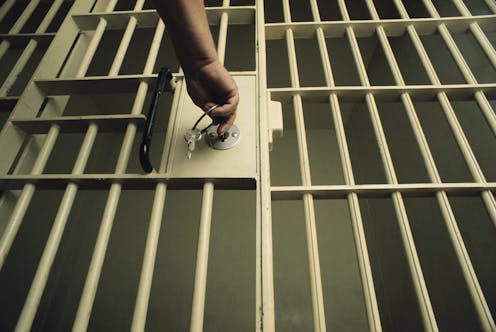Prison turns life upside down – giving low-risk prisoners longer to prepare for their sentences would benefit everyone
- Written by Christine McCarthy, Senior lecturer in Interior Architecture, Te Herenga Waka — Victoria University of Wellington

Almost everyone who’s moved house has a story to tell – the truck was too small, the power got cut off too soon, the cat got lost on the day. Moving house can be stressful, but the better prepared you are, the higher the chances you’ll enjoy the result.
But this is unlikely if you’re moving to prison.
When you are arrested and detained in custody – or when your court hearing ends with unexpected imprisonment – there’s no time to sort out feeding the cat, picking kids up from school or redirecting mail.
Currently in New Zealand, only exceptional circumstances mean people get time to prepare for jail. The Sentencing Act permits a two month deferral on humanitarian grounds, such as terminal illness or suicide risk. But there’s no allowance for the normal – and often traumatic – disruption of going to prison in the first place.
Fitting your life into a suitcase
One of my specialist research areas is prison architecture, and it was looking into the issue of prisoner property that first made me think about the transition to prison life. Prisoner property is a largely invisible issue, as most of us rarely think about how prison affects people’s lives.
But prison isn’t simply the removal of someone from society. It’s an extreme example of how architecture can fit or not fit someone’s life. Almost everything we associate with being at home – the ability to control the space we live in, to make choices about how we occupy space, to have things with personal significance around us – is taken away.
The unique power dynamics inherent to prisons make it difficult to separate their built environments from the specific demands of life behind bars. Architecture is always about the way people use buildings; even the banal issue of how much storage space there is. In prison these mundane details become – literally – inescapable.
The challenge of moving, of being in a new space, is amplified in prison. The human aspects of an environment are stripped down to what you can fit into the equivalent space of a small suitcase.
In New Zealand this “suitcase” for stored prisoner property is 500mm x 400mm x 300mm – less than your checked-in luggage for an Air New Zealand flight.
Time to prepare
Giving as many people as possible time to prepare for prison won’t increase their storage space, but it will enable them to prepare psychologically and get their affairs in order.
As Australia’s Justice Action advocacy group explains, going to prison can mean losing things that make a home:
Every item, gift, photo of loved ones and clothing. Certificates and formal documentation are lost too […] many prisoners […] lose everything except the clothes they were wearing on arrest.
Having a partner can make some things easier, but not everything.
In some countries, including Norway, Denmark, Sweden and the US federal system, a deferred prison start date is a norm for low-risk prisoners. In the US it’s called voluntary or self-surrender. In Norway it’s the “waiting list” or “call up” system.
On the face of it, this sounds positive. Norwegian research found time before prison helped prisoners prepare practically and emotionally.
One went on a road trip to show his son the prison where he was going to serve time. Another celebrated Christmas with family in November because he’d be in prison in December. Others worked overtime to reduce the financial cost of imprisonment.
People can also investigate what prison life will be like. Some find taking themselves to prison is less humiliating than arriving in a prison van. Importantly, this time also helped prisoners maintain positive relationships after their release.
But it’s not all positive. Waiting can be hard. One interviewee told researchers:
You get worn out mentally, have trouble sleeping and it takes so much time where you just wait and wait and wait and wait […] you live in a sort of vacuum.
In Norway, some people wait months or years – and this delay doesn’t reduce their overall sentence. This is because the waiting list is to prevent prison overcrowding. It is an alternative to building more prisons, not a way to better prepare people for prison.
Read more: How a maximum security prison offers a pathway to academic excellence and a PhD
A better life after prison
But that’s no reason why New Zealand couldn’t take this system – in the spirit of Kiwi ingenuity – and import it for positive outcomes.
For example, we could expand the Sentencing Act so that low-risk prisoners have time to arrange power of attorney for their financial and legal matters, or spend time with whānau to better prepare them for life with a family member in prison.
It’s well understood that good reintegration into society after prison can reduce reoffending. The Norwegian research suggests time before prison also matters.
Too little attention is given to the damage caused by uprooting people from their social networks and their homes. Reducing this impact on those going to prison, and who pose no public risk, would be humane. It might also foster better outcomes when prisoners return home.
Authors: Christine McCarthy, Senior lecturer in Interior Architecture, Te Herenga Waka — Victoria University of Wellington





